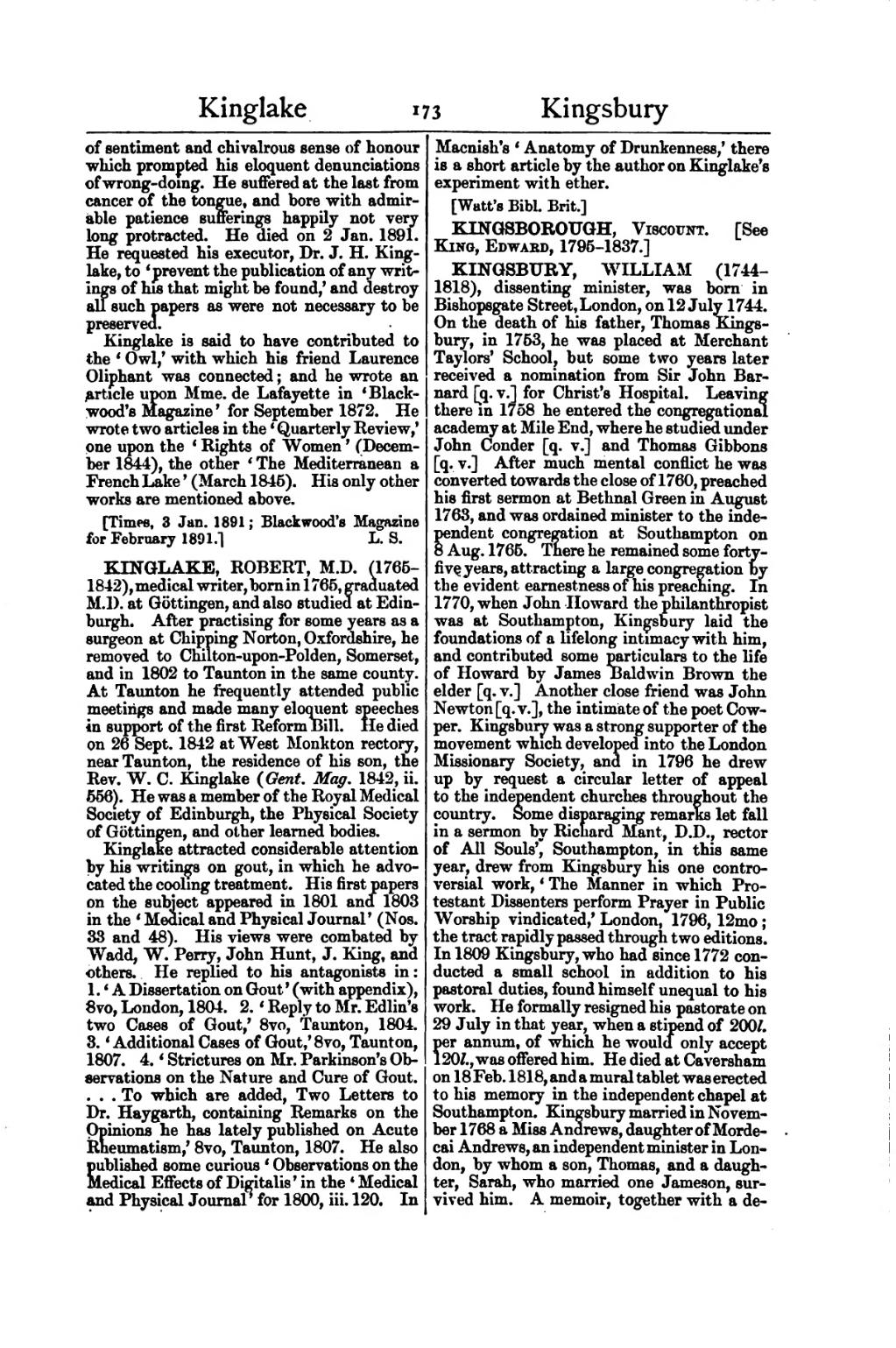of sentiment and chivalrous sense of honour which prompted his eloquent denunciations of wrong-doing. He suffered at the last from cancer of the tongue, and bore with admirable patience sufferings happily not very long protracted. He died on 2 Jan. 1891. He requested his executor, Dr. J. H. Kinglake, to ‘prevent the publication of any writings of his that might be found,’ and destroy all such papers as were not necessary to be preserved.
Kinglake is said to have contributed to the ‘Owl,’ with which his friend Laurence Oliphant was connected; and he wrote an article upon Mme. de Lafayette in ‘Blackwood's Magazine’ for September 1872. He wrote two articles in the ‘Quarterly Review,’ one upon the ‘Rights of Women’ (December 1844), the other ‘The Mediterranean a French Lake’ (March 1845). His only other works are mentioned above.
[Times, 3 Jan. 1891; Blackwood's Magazine for February 1891.]
KINGLAKE, ROBERT, M.D. (1765–1842), medical writer, born in 1765, graduated M.D. at Göttingen, and also studied at Edinburgh. After practising for some years as a surgeon at Chipping Norton, Oxfordshire, he removed to Chilton-upon-Polden, Somerset, and in 1802 to Taunton in the same county. At Taunton he frequently attended public meetings and made many eloquent speeches in support of the first Reform Bill. He died on 26 Sept. 1842 at West Monkton rectory, near Taunton, the residence of his son, the Rev. W. C. Kinglake (Gent. Mag. 1842, ii. 556). He was a member of the Royal Medical Society of Edinburgh, the Physical Society of Göttingen, and other learned bodies.
Kinglake attracted considerable attention by his writings on gout, in which he advocated the cooling treatment. His first papers on the subject appeared in 1801 and 1803 in the ‘Medical and Physical Journal’ (Nos. 33 and 48). His views were combated by Wadd, W. Perry, John Hunt, J. King, and others. He replied to his antagonists in:
- ‘A Dissertation on Gout’ (with appendix), 8vo, London, 1804.
- ‘Reply to Mr. Edlin's two Cases of Gout,’ 8vo, Taunton, 1804.
- ‘Additional Cases of Gout,’ 8vo, Taunton, 1807.
- ‘Strictures on Mr. Parkinson's Observations on the Nature and Cure of Gout. … To which are added, Two Letters to Dr. Haygarth, containing Remarks on the Opinions he has lately published on Acute Rheumatism,’ 8vo, Taunton, 1807.
He also published some curious ‘Observations on the Medical Effects of Digitalis’ in the ‘Medical and Physical Journal’ for 1800, iii. 120. In Macnish's ‘Anatomy of Drunkenness,’ there is a short article by the author on Kinglake's experiment with ether.
[Watt's Bibl. Brit.]
KINGSBOROUGH, Viscount. [See King, Edward, 1795–1837.]
KINGSBURY, WILLIAM (1744–1818), dissenting minister, was born in Bishopsgate Street, London, on 12 July 1744. On the death of his father, Thomas Kingsbury, in 1753, he was placed at Merchant Taylors' School, but some two years later received a nomination from Sir John Barnard [q. v.] for Christ's Hospital. Leaving there in 1758 he entered the congregational academy at Mile End, where he studied under John Conder [q. v.] and Thomas Gibbons [q. v.] After much mental conflict he was converted towards the close of 1760, preached his first sermon at Bethnal Green in August 1763, and was ordained minister to the independent congregation at Southampton on 8 Aug. 1765. There he remained some forty-five years, attracting a large congregation by the evident earnestness of his preaching. In 1770, when John Howard the philanthropist was at Southampton, Kingsbury laid the foundations of a lifelong intimacy with him, and contributed some particulars to the life of Howard by James Baldwin Brown the elder [q. v.] Another close friend was John Newton [q. v.], the intimate of the poet Cowper. Kingsbury was a strong supporter of the movement which developed into the London Missionary Society, and in 1796 he drew up by request a circular letter of appeal to the independent churches throughout the country. Some disparaging remarks let fall in a sermon by Richard Mant, D.D., rector of All Souls', Southampton, in this same year, drew from Kingsbury his one controversial work, ‘The Manner in which Protestant Dissenters perform Prayer in Public Worship vindicated,’ London, 1796, 12mo; the tract rapidly passed through two editions. In 1809 Kingsbury, who had since 1772 conducted a small school in addition to his pastoral duties, found himself unequal to his work. He formally resigned his pastorate on 29 July in that year, when a stipend of 200l. per annum, of which he would only accept 120l., was offered him. He died at Caversham on 18 Feb. 1818, and a mural tablet was erected to his memory in the independent chapel at Southampton. Kingsbury married in November 1768 a Miss Andrews, daughter of Mordecai Andrews, an independent minister in London, by whom a son, Thomas, and a daughter, Sarah, who married one Jameson, survived him. A memoir, together with a de-
